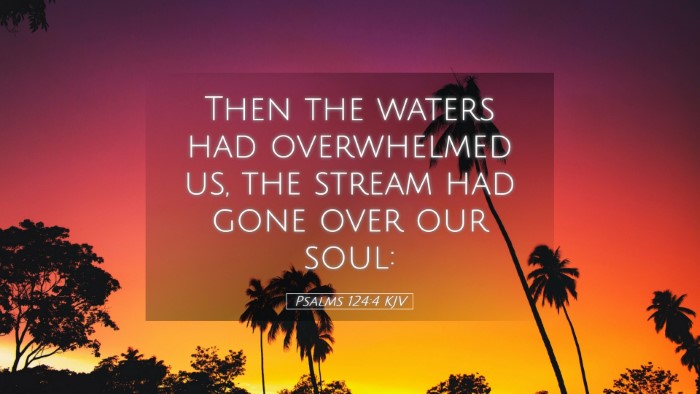Psalms 124:4 Commentary
Verse: "Then the waters had overwhelmed us, the stream had gone over our soul."
Introduction
This verse from Psalms 124 encapsulates the theme of divine deliverance amidst adversities. The imagery of overwhelming waters serves not only as a metaphor for troubles but also as a symbol of the perils that threaten the soul. This commentary draws insights from various public domain sources to elucidate the profound theological implications of this verse.
The Context of Psalm 124
This Psalm is a part of a series of songs that express gratitude for God's protection. Traditionally attributed to David, it reflects on the collective experience of Israel, particularly manifesting a sense of national deliverance from danger. The psalmist uses vivid imagery to depict what could have happened had the Lord not been their shield.
Exposition of the Verse
Metaphorical Significance of 'Waters'
Albert Barnes notes that in biblical literature, waters often symbolize overwhelming troubles. Just as the flood can obliterate land, the overwhelming circumstances of life can threaten to engulf one's spirit. The imagery evokes a sense of helplessness and despair which can resonate with the believer’s experience in times of crisis.
The Nature of Trials
Matthew Henry emphasizes the nature of trials that believers may face, suggesting that these are dynamic forces that can overtake us if not for divine intervention. In this verse, "overwhelmed" is not merely a description of circumstance but a stark reminder of humanity's frailty without God.
The Divine Protection
Adam Clarke provides insight into the protective assurance that followers of God can claim. He posits that the preceding verses help us recognize that it is God’s grace which prevents these overwhelming waters from becoming our ultimate fate. The phrase "had overwhelmed us" is indicative of the calamities that are kept at bay by God's sovereign power.
Theological Implications
Human Vulnerability
This verse starkly lays bare human vulnerability. Spiritual leaders are reminded here of the importance of acknowledging our own weaknesses. For pastors and theologians, this affirms the need for reliance on God's strength rather than self-sufficiency.
God’s Sovereignty
The overarching theme in this passage reveals a profound truth about God's sovereignty. The psalmist’s reflections on deliverance clearly assert that it is not human effort that secures safety but divine intervention. Henry articulates that any understanding of deliverance must confront the reality of God's omnipotence in safeguarding His people.
The Community Aspect of Deliverance
One cannot overlook the communal dimension embedded in this verse. The use of "we" emphasizes that the trials faced were not individual but collective. This carries significant weight for congregational life and pastoral ministry, encouraging unity among believers when faced with adversity.
Practical Applications
- For Pastors: This verse can be used as a source of comfort and encouragement in preaching. A reminder to the congregation about God’s protection can instill hope and resilience during challenging times.
- For Students: Reflecting on the metaphor of overwhelming waters aids in understanding how biblical imagery influences one’s spiritual journey and contextualizes personal struggles.
- For Theologians: The study of God’s providence as highlighted in this psalm can open discussions about the nature of divine protection in a world fraught with trials.
Conclusion
Psalms 124:4 invites us to reflect on the perils that life presents but equally reminds us of the steadfast protection that our faith assures. By analyzing this verse through the writings of Matthew Henry, Albert Barnes, and Adam Clarke, we can gain a comprehensive understanding of the significance of trusting in God during overwhelming circumstances. The message is clear: with God as our helper, no flood of adversity can overtake us.


